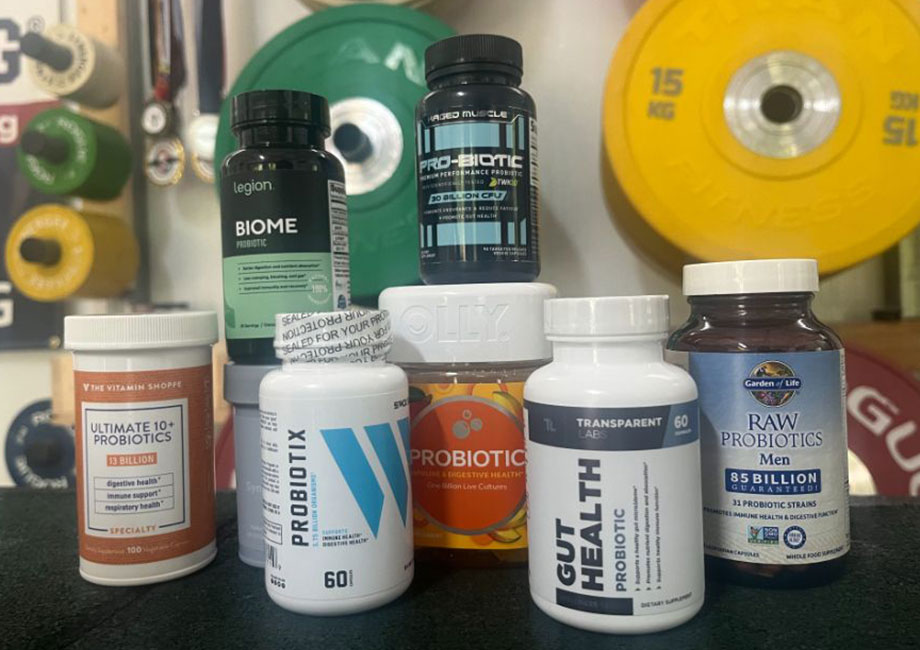If you’ve been looking for ways to feel more energized, improve your overall health, relieve uncomfortable digestive symptoms, or keep things regular, you’ve likely heard of probiotics.
The potential health benefits of the best probiotics have been shouted across the rooftops for years, so you might assume that adding them to your health and wellness routine will automatically make you feel like a new and improved version of yourself.
In reality, however, this isn’t how probiotics work. Confusingly, you may even feel worse at first.
Whether you’re feeling a little off after starting a probiotic or researching potential probiotics side effects, I’ve got you covered. As a registered dietitian, I’ll give you the low-down on the side effects of these “friendly germs”, discuss who would most benefit from them, and explain who should be cautious about taking them.
Medical disclaimer: This article is intended for educational and informational purposes only. It is not intended as a substitute for medical advice. For health advice, contact a licensed healthcare provider.
What Are Probiotics?
According to the International Scientific Association for Probiotics and Prebiotics1, probiotics are “live microorganisms that, when administered in adequate amounts, confer a health benefit on the host.”
Probiotics aren’t just “helpful bacteria”; they have to positively impact your health in some way. To understand how they do this, you first need to study the gut microbiome.
Your gut is home to billions of different types or “strains” of bacteria. Some strains of gut bacteria are pathogenic (disease-causing) and can lead to inflammation and oxidative stress.
Commensal, beneficial bacteria, on the other hand, reduce inflammation in the intestines, maintain the integrity of the gut lining, produce compounds that impair the growth of dangerous bacteria, and support a healthy immune system.
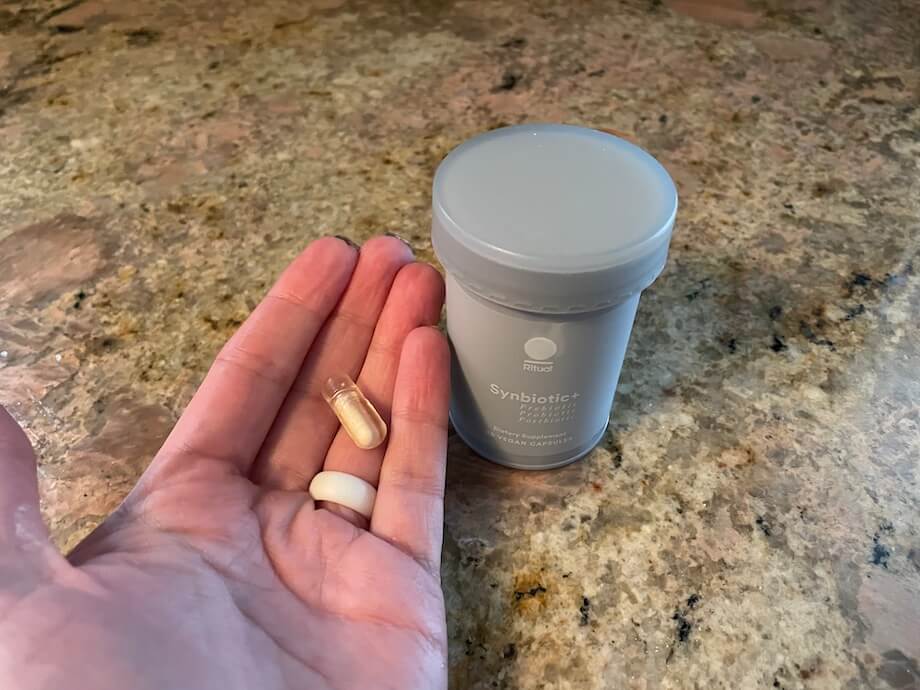
All these microbes—good and bad—make up your gut microbiota.
Probiotics are consumed to increase the number of beneficial, “healthy” bacteria in the gut and crowd out potentially pathogenic bacteria to improve overall gut health. They’re available in the following forms:
- Dietary supplements in the form of capsules, powders, or liquids, available as single or multiple strains
- Fermented foods such as yogurt, kefir, sauerkraut, kimchi, miso, tempeh, kombucha, and some pickles
- Processed probiotic foods like nutrition bars, soda alternatives, protein powder, greens powders, etc. which have had probiotics added to them
Probiotics need to be taken consistently, contain live bacteria, and survive digestion to colonize the gut and provide health benefits. Some manufacturing processes, like pasteurization, kill off live bacteria, as does cooking.
When choosing yogurt and cultured dairy products, look for the “Live & Active Cultures Seal” to ensure that the good bacteria are still alive in the final product. Probiotic supplements should list the number of colony-forming units (CFUs) in each serving, which indicates the number of living bacteria.
Another tip: don’t confuse probiotics with prebiotics. While probiotics are beneficial bacteria, prebiotics are natural compounds found in plant-based foods that fuel the healthy bacteria already in your gut, helping these strains thrive.
Prebiotics are sometimes added to probiotic supplements to make them more effective, but you can also get prebiotics from many fiber-rich foods.
RELATED: The 11 Best Prebiotics to Support Your Gut Health
6 Potential Probiotics Side Effects
Fortunately, probiotics made from strains of good bacteria found naturally in the gut microbiome appear to be safe and well-tolerated for most people.
Side effects that do occur seem more likely to result from probiotic supplements than from fermented foods. While rare, you should be wary of possible side effects before starting a probiotic.
1. Mild Digestive Symptoms
The most common side effects of probiotics include mild digestive symptoms such as gas, bloating, nausea, and diarrhea. These can be uncomfortable, but they usually resolve within a few weeks2 once your gut adjusts.
For some people, digestive symptoms can be more intense. For example, probiotics may worsen abdominal pain in people with Inflammatory Bowel Disease (IBD).
Additionally, the yeast-based probiotic S. boulardii may lead to increased thirst and constipation3.
2. Headaches
According to systematic reviews, people with histamine intolerance4 may be prone to headaches when taking probiotics, as some strains of bacteria, such as L. casei and L. bulgaricus, are suspected to lead to increased histamine levels.
Research on this relationship is conflicting; however, a 2022 test tube study5 involving a blend of 24 different probiotic strains, including L. casei, didn’t find any significant histamine production by these bacteria. Currently, it isn’t clear which probiotic dosages are most likely to be problematic.
3. Allergic Reactions
Probiotic supplements made with or manufactured on the same equipment as foods that include milk, soy, or eggs can cause allergic reactions in individuals sensitive to these ingredients, so it’s important to double-check the label of any dietary supplement you’re interested in.
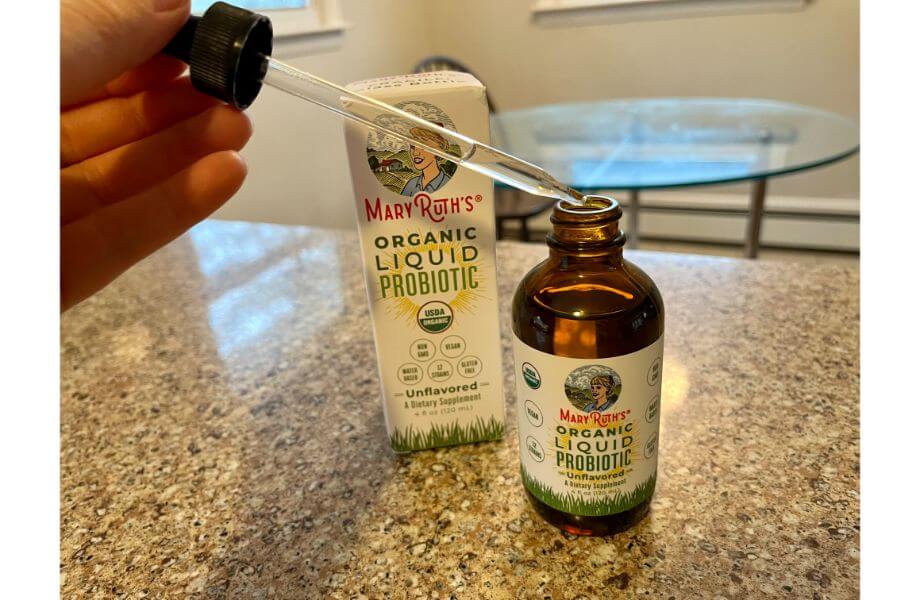
Supplements can also become cross-contaminated with gluten, depending on the manufacturing process. If you have Celiac disease, look for probiotics that are certified gluten-free. If you have Crohn’s disease or ulcerative colitis, speak with your doctor before starting probiotics.
4. Antibiotic Resistance
Another concern with probiotics is the potential for people taking them to become antibiotic-resistant. Theoretically, any antibiotic-resistant genes present in probiotic bacterial strains could transfer to the dangerous bacteria naturally present in our gut, making life-saving antibiotic medications ineffective.
Fortunately, however, this theoretical concern has never been observed in the real world2. Probiotic strains are usually carefully evaluated to ensure that no antibiotic-resistant genes are present.
5. Infection
Rarely probiotic bacteria have been linked to serious infections in hospitalized people.
Premature infants and adults who are critically ill, have had a central venous catheter placed, or are immunocompromised, such as cancer patients, are at greatest risk of contracting an infection after receiving probiotics due to compromised immune systems, so their medical treatment must be handled by a team knowledgeable about these risks.
6. Food Poisoning
It’s highly unlikely that you’d get food poisoning from probiotic supplements, but it’s a real risk with improperly prepared fermented foods.
This is most common with fermented foods made at home, which may not contain enough salt or are prepared at the incorrect temperature to prevent the growth of harmful microbes. Using kitchen equipment that isn’t sanitized properly can also be a problem.
Food poisoning symptoms typically resolve within a couple of days and aren’t life-threatening. However, some foodborne pathogens like Clostridium botulinum (botulism) and Listeria monocytogenes found in improperly fermented foods can be deadly.
RELATED: Best Probiotic for Men
Who Should Take Probiotics?
Despite their popularity, the health benefits of probiotics for generally healthy people remain unclear. For people without specific health problems, taking a probiotic may not be any more helpful than focusing on a healthy diet that includes plenty of whole, fiber-rich plant foods naturally high in prebiotics.
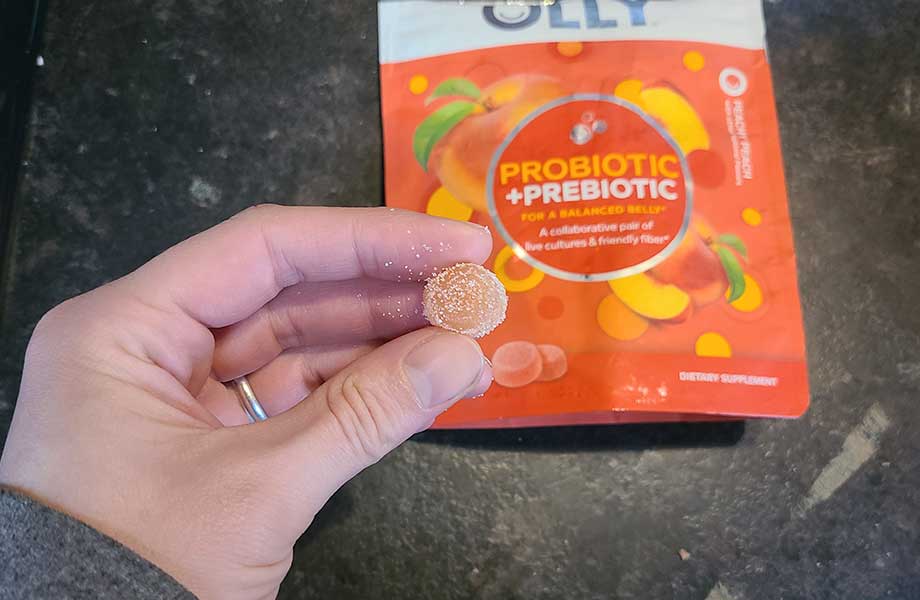
RELATED: Best Fiber Supplement
Current research suggests that probiotics are probably most helpful for people with certain digestive conditions, although other conditions may also benefit.
Antibiotic-Associated Diarrhea
Antibiotics are a cornerstone of modern medicine, improving quality of life and even saving lives. The diarrhea that can occur when taking them, however, can lead to dehydration if left unaddressed for too long.
Fortunately, taking a probiotic containing Lactobacillus rhamnosus GG or S. boulardii within the first two days of starting an antibiotic has been shown to lower the risk of antibiotic-associated diarrhea in both children and adults up to 64 years of age, according to the National Institutes of Health6.
Traveler’s Diarrhea
If you plan on traveling to a country where traveler’s diarrhea is a concern, you might consider packing a probiotic in your carry-on.
Probiotics, especially Lactobacillus rhamnosus GG and S. boulardii, may help prevent traveler’s diarrhea1 when traveling to developing countries where the risk of contracting a food-borne illness is higher.
Clostridioides Difficile (C. diff) Infection
C. diff is a bacterial infection commonly contracted during stays in the hospital or nursing homes. Probiotics may not help prevent the infection itself, but they can help prevent C. diff-associated diarrhea7.
Irritable Bowel Syndrome (IBS)
IBS is a digestive condition characterized by symptoms like abdominal pain, cramping, diarrhea, constipation, and flatulence. It’s often triggered by stress or certain foods, but probiotics are a promising strategy to help manage these symptoms.
When studied in participants with IBS, adults taking probiotics with Bifidobacterium breve, Bifidobacterium longum, or Lactobacillus acidophilus experienced less abdominal pain compared to placebo5.
Additionally, adults with IBS who took probiotics containing Bifidobacterium breve, Bifidobacterium infantis, Lactobacillus casei, or Lactobacillus plantarum had less abdominal distention. Flatulence was improved with a variety of different probiotic strains.
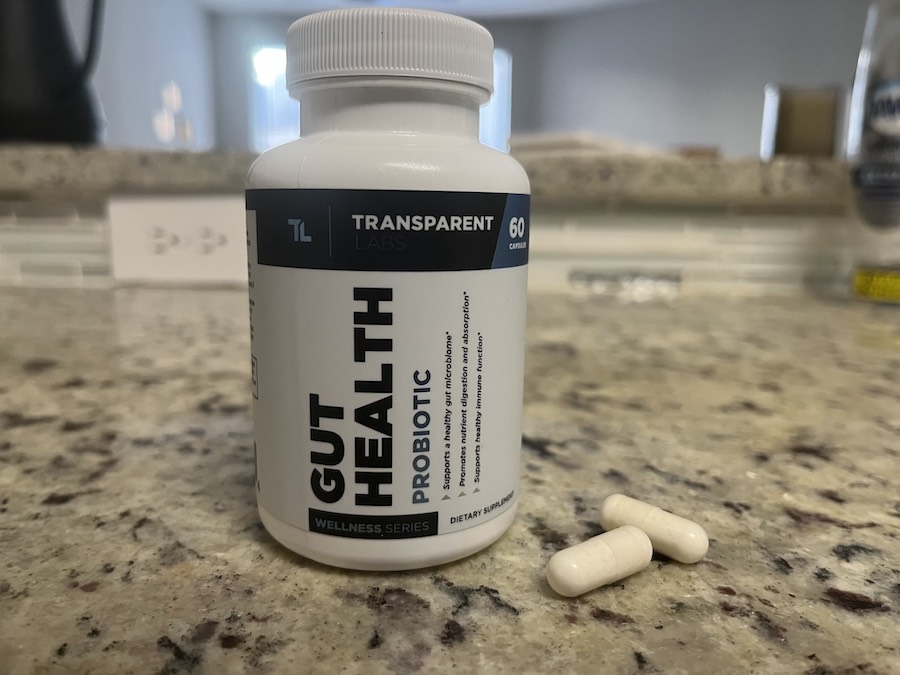
This is promising, but keep in mind that experts still aren’t sure which specific strains or dosages are most effective for treating different IBS types. That said, there needs to be more research before recommendations are made.
Lactose Intolerance
Interestingly, the consumption of probiotic-rich yogurt has been shown to reduce the severity of symptoms like bloating and diarrhea in people with lactose intolerance8 compared to milk.
It appears that these bacteria produce lactase, the enzyme needed to digest lactose that is missing in people with lactose intolerance, making yogurt easier to digest.
Some Urogenital Conditions
The potential health benefits of probiotics may not be limited only to the digestive tract. Researchers have suggested they could also help manage urogenital conditions such as bacterial vaginosis, candidal vaginitis, and urinary tract infections2.
However, research in this area is still limited, so it isn’t clear which bacterial strains or dosages are the most effective.
Probiotics Side Effects: Final Thoughts
Most people can tolerate probiotics in food and supplements. Side effects are rare and are usually limited to mild digestive upset that resolves within a few weeks once your digestive system adjusts to the probiotic.
To minimize side effects and get the most out of your probiotic, try the following tips:
- Eat a balanced diet rich in whole plant-based foods. This will provide your gut with the dietary fiber, prebiotic foods, and antioxidants it needs to thrive.
- Choose supplements made from well-researched strains of probiotics
- Start slow. Take your probiotic every other day or begin with a lower dose.
- Check labels carefully for the presence of allergens.
- Choose fermented foods from reputable manufacturers.
- Discuss any side effects that are severe or that don’t resolve within a few weeks with your physician.
Also, keep in mind that supplements like probiotics aren’t FDA-approved.
Probiotics Side Effects: FAQs
Who should not take probiotics?
People at higher risk of health problems when taking probiotics include:
– Pregnant women with obesity as they may have an increased risk of pre-eclampsia9 when taking probiotics
– Individuals with weakened immune systems
– People with central venous catheters
– Premature infants
– Individuals with severe acute pancreatitis
– Critically ill patients
In these cases, probiotic use should be discussed with your physician.
What happens when you take probiotics every day?
Taking probiotics every day can temporarily colonize the gut with beneficial bacteria, potentially helping to reduce the inflammation that can occur when harmful bacteria outnumber the good bacteria in your body.
How do you know if a probiotic is too strong?
There aren’t any known problems associated with probiotics being too strong other than the mild digestive symptoms like diarrhea, gas, bloating, and nausea, but they may be a waste of money. Higher doses don’t necessarily provide greater health benefits.
How do you know if probiotics are working
If you’re taking probiotics for specific health conditions, track your labs and symptoms (such as abdominal bloating or pain) to see whether they improve. If you’re taking probiotics for general gut health, you may or may not notice a difference in your energy levels or mood.
These statements have not been evaluated by the Food and Drug Administration. This product is not intended to diagnose, treat, cure, or prevent any diseases.
References
- Hill C, Guarner F, Reid G, et al. Expert consensus document. The International Scientific Association for Probiotics and Prebiotics consensus statement on the scope and appropriate use of the term probiotic. Nat Rev Gastroenterol Hepatol. 2014;11(8):506-514. doi:10.1038/nrgastro.2014.66
- Williams NT. Probiotics. Am J Health Syst Pharm. 2010;67(6):449-458. doi:10.2146/ajhp090168
- Tung JM, Dolovich LR, Lee CH. Prevention of Clostridium difficile infection with Saccharomyces boulardii: a systematic review. Can J Gastroenterol. 2009 Dec;23(12):817-21. doi: 10.1155/2009/915847. PMID: 20011734; PMCID: PMC2805518.
- Hrubisko M, Danis R, Huorka M, Wawruch M. Histamine Intolerance-The More We Know the Less We Know. A Review. Nutrients. 2021;13(7):2228. Published 2021 Jun 29. doi:10.3390/nu13072228
- Stuivenberg G, Daisley B, Akouris P, Reid G. In vitro assessment of histamine and lactate production by a multi-strain synbiotic. J Food Sci Technol. 2022;59(9):3419-3427. doi:10.1007/s13197-021-05327-7
- National Institutes of Health Office of Dietary Supplements. Probiotics – Fact Sheet for Health Professionals. NIH website. Accessed 3/12/24.
- Parker EA, Roy T, D’Adamo CR, Wieland LS. Probiotics and gastrointestinal conditions: An overview of evidence from the Cochrane Collaboration. Nutrition. 2018;45:125-134.e11. doi:10.1016/j.nut.2017.06.024
- Goldin BR, Gorbach SL. Clinical indications for probiotics: an overview. Clin Infect Dis. 2008;46 Suppl 2:S96-S151. doi:10.1086/523333
- Merenstein D, Pot B, Leyer G, et al. Emerging issues in probiotic safety: 2023 perspectives. Gut Microbes. 2023;15(1):2185034. doi:10.1080/19490976.2023.2185034


